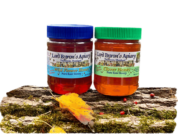Doctors recommend Pure Raw Honey as a SORE THROAT & COUGH REMEDY. Raw honey provides soothing natural relief.
Backed by scientific studies.
Raw Honey is an effective, affordable and safe natural remedy that is available over the counter. A much better alternative than unnecessary antibiotics that doctors over prescribing.
 Honey has been a praised healer for its therapeutic properties since ancient times. Known as a delicious sweet, nutritious food made by bees from the nectar of flowers. The age old prescription for your sore throat is a simply delicious warm cup of your favorite tea or hot water, add two teaspoons of raw honey, lemon and ginger.
Honey has been a praised healer for its therapeutic properties since ancient times. Known as a delicious sweet, nutritious food made by bees from the nectar of flowers. The age old prescription for your sore throat is a simply delicious warm cup of your favorite tea or hot water, add two teaspoons of raw honey, lemon and ginger.
Kids are returning to school and you want to give them every advantage to stay and be healthy. Raw Honey is a great strategy. It boosts their immune system and is a sweet, healthy way to sooth them when and if they get a sore throat and cough.
Sip, savor and enjoy your journey back to health.
All Our Honey is Raw Honey from the Maryland hills.  SHOP RAW HONEY
SHOP RAW HONEY

Please note: it is important to use only the raw honey because pasteurized honey is processed at a high heat that destroys the nutritional healing properties. Also, honey should not be given to infants under 1 year old. Honey can carry bacteria, such as Clostridium botulinum, which can be especially dangerous for babies younger than 1 year of age.
What is Honey?
Honey is a natural substance that bees produce from honeydew or nectar of flowers. Bees collect nectar or honeydew, and transport them into the hive, which begins the processes that lead to their transformation into honey: the concentration and the enzymatic conversion of sugar. Honey composition is closely related to its botanical origin, and to the processing and environmental conditions [3] read more
Raw honey is recommended by your doctor.
The Centers for Disease Control and Prevention (CDC) Trusted Source also recommends using honey for your sore throat accompanied by a cough. The advice is part of a growing effort to tackle the problem of antibiotic resistance due to overuse of over prescribing.
Dr Susan Hopkins, from PHE, said: “Antibiotic resistance is a huge problem and we need to take action now to reduce antibiotic use. “Taking antibiotics when you don’t need them puts you and your family at risk of developing infections which in turn cannot be easily treated.
The researchers suggest honey might therefore provide an alternative when doctors want to prescribe something to safely treat upper respiratory tract symptoms. They conclude: “Honey is a frequently used lay remedy that is well known to patients. It is also cheap, easy to access, and has limited harms. When clinicians wish to prescribe for URTI, we would recommend honey as an alternative to antibiotics.
“Honey is more effective and less harmful than usual care alternatives and avoids causing harm through antimicrobial resistance.”
Upper respiratory tract infections (URTIs) affect the nose, throat, voice box and the large air passages (bronchi) that lead from the windpipe to the lungs. (300)
The National Cancer Institute research prospectus states
,”…also used as a medicine for stimulating healing of wounds, tissue regeneration, and alleviating gastrointestinal disorders, gingivitis, and various other pathologies. The therapeutic effect of honey results from the presence of various antioxidant molecules, including phenolic compounds, such as flavonoids and phenolic acids [4]. Several in vitro and in vivo studies have demonstrated the antimicrobial, antiviral, antifungal, anticancer, and antidiabetic activity of honey. In addition, the protective effect on cardiovascular, nervous, respiratory, and gastrointestinal systems has been also proven [5,6]. A protective effect of honey was also observed in physiological conditions characterized by high levels of free radicals, such as those of athletes practicing different sports [7] (Figure 1).
5.4.3. Respiratory System
Even in popular medicine, honey is commonly utilized as a coughing sedative. Scientific studies regarding the protective activity of honey in the respiratory system mainly concerns asthma. Asthma is a chronic inflammatory disease that is characterized by generally reversible obstruction of the lower airways, often as result of activity of allergens [104]. Kamaruzaman et al. have shown that honey inhalation is able to reduce inflammation of the lower airways in a rabbit model of ovalbumin-induced chronic asthma. Honey was capable of both preventing and improving the structural changes that occur following the induction of asthma through the allergen. It is known that honey is also able to reduce the number of inflammatory cells that are present in the fluid deriving from bronchoalveolar lavage, also inhibiting the bronchial hyperplasia of the goblet cells [105].
Finally, the role of honey in co-treatment with standard drugs in allergic rhinitis in subjects recruited from an otolaryngology clinic was investigated. The ingestion of honey in high doses (1 g/kg body weight daily for four weeks) improved the overall symptoms up to one month after the end of treatment [106]. (1)”
Clinical research supports the effectiveness of using raw honey.
It is a sweet remedy worth giving it a try.
Resources
-
https://www.ncbi.nlm.nih.gov/pmc/articles/PMC6225430/
Review Volatile compounds in honey: a review on their involvement in aroma, botanical origin determination and potential biomedical activities.
Manyi-Loh CE, Ndip RN, Clarke AM
Int J Mol Sci. 2011; 12(12):9514-32.
[PubMed] [Ref list]
-
Manyi-Loh C.E., Ndip R.N., Clarke A.M. Volatile compounds in honey: A review on their involvement in aroma, botanical origin determination and potential biomedical activities. Int. J. Mol. Sci. 2011;12:9514–9532. doi: 10.3390/ijms12129514. [PMC free article] [PubMed] [CrossRef] [Google Scholar]
-
Noori S., Faiza S., Mohammed A., Amjed A., Khelod Y.S., Ahmad A.A.L.G. Effects of natural honey on polymicrobial culture of various human pathogens. Arch. Med. Sci. 2014;10:246–250. [PMC free article] [PubMed] [Google Scholar]
-
Alvarez-Suarez J.M., Giampieri F., Battino M. Honey as a source of dietary antioxidants: Structures, bioavailability and evidence of protective effects against human chronic diseases. Curr. Med. Chem. 2013;20:621–638. doi: 10.2174/092986713804999358. [PubMed] [CrossRef] [Google Scholar]
-
Alvarez-Suarez J.M., Giampieri F., Cordero D., Gasparrini M. Forbes-Hernandez, T.Y.; Mazzoni, L.; Afrin, S.; Beltran-Ayala, P.; Gonzales-Paramas, A.M.; Santos-Buelga, C.; et al. Activation of AMPK/Nrf2 signaling by Manuka honey protects human dermal fibroblasts against oxidative damage by improving antioxidant response and mitochondrial function promoting wound healing. J. Funct. Foods. 2016;25:38–49. [Google Scholar]
-
PeternelJ T.T., Coombes J.S. Antioxidant supplementation during exercise training: Beneficial or detrimental? Sports Med. 2011;41:1043–1069. doi: 10.2165/11594400-000000000-00000. [PubMed] [CrossRef] [Google Scholar]
-
Bâcvarov V.I. Treatment of chronic bronchitis and bronchial asthma with honey. Ther. Ggw. 1970;109:260–268. [PubMed] [Google Scholar]
-
Kamaruzaman N.A., Sulaiman S.A., Kaur G., Yahaya B. Inhalation of honey reduces airway inflammation and histopathological changes in a rabbit model of ovalbumin-induced chronic asthma. BMC Complement. Altern. Med. 2014;14:176. doi: 10.1186/1472-6882-14-176. [PMC free article] [PubMed] [CrossRef] [Google Scholar]
-
Asha’ari Z.A., Ahmad M.Z., Jihan W.S., Che C.M., Leman I. Ingestion of honey improves the symptoms of allergic rhinitis: Evidence from a randomized placebo-controlled trial in the East Coast of Peninsular Malaysia. Ann. Saudi Med. 2013;33:469–475. doi: 10.5144/0256-4947.2013.469. [PMC free article] [PubMed] [CrossRef] [Google Scholar]
-
https://cpatient.info/news-and-features/coughs-colds-and-sore-throats-is-honey-better-than-over-the-counter-treatments
-
https://www.theguardian.com/science/2020/aug/19/honey-better-treatment-for-coughs-and-colds-than-antibiotics-study-clams
-
https://www.theguardian.com/society/2018/aug/23/simply-ill-honey-much-better-for-patients-than-pills-doctors-to-be-told